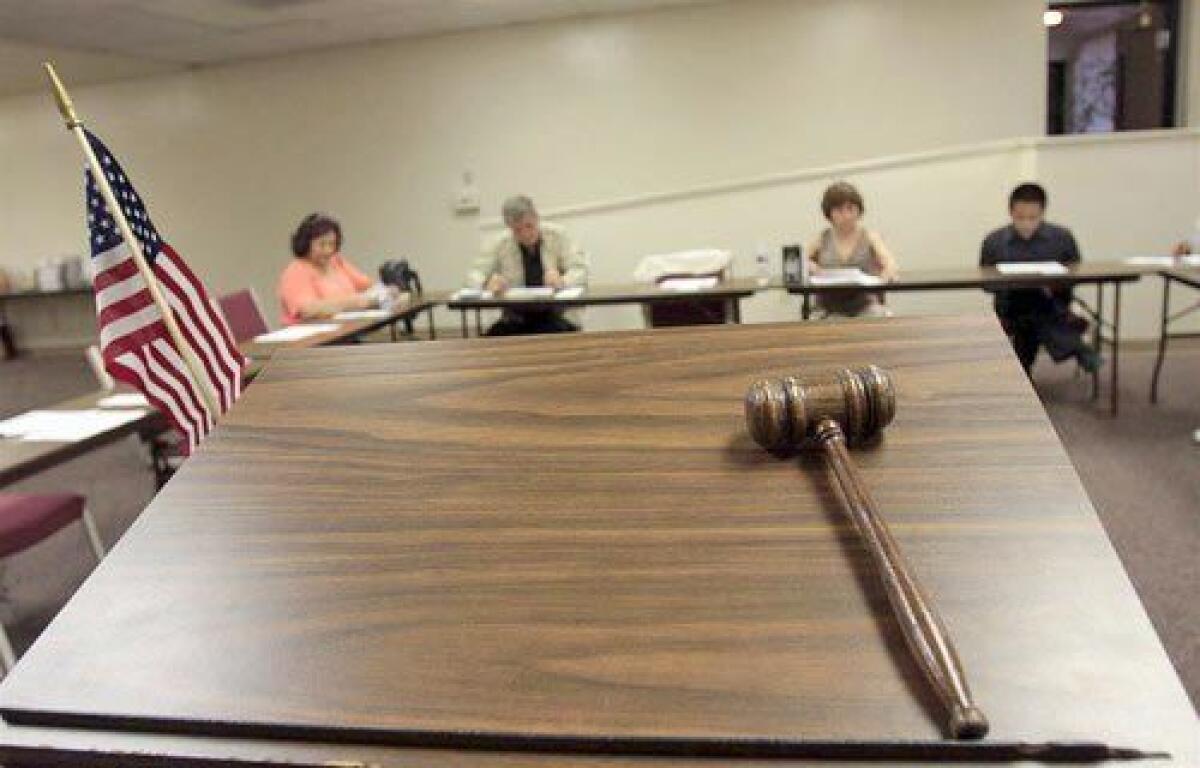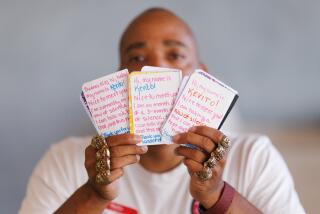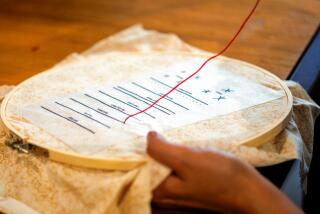Opening up at Toastmasters to tackle fear of public speaking

You’re introduced to make a presentation. Suddenly, your legs go numb, your mouth gets dry, your mind goes blank and the only thing you hear is your heart throbbing.
Sound familiar?
For many people, public speaking tops the list of immobilizing fears. And with e-mail and text-messaging becoming near-universal forms of communication, many of us don’t get enough practice at just plain talking.
But there’s an old-school solution in this digital age, and it beats the potentially psychologically scarring practice of visualizing audience members in their underwear: Toastmasters.
Since 1924, Toastmasters International has offered the chance to learn through self-paced speaking assignments at club meetings. The group has long attracted corporate climbers and entrepreneurs looking to enhance their speaking skills and confidence and parlay them into promotions and business opportunities.
“It helped me a lot in the business world,” said Ron Peña, who owns Aristo Office Equipment in Los Angeles. “I couldn’t have accomplished what I have if it wasn’t for Toastmasters.”
Although membership was limited to men for nearly five decades, today’s Toastmasters welcomes women and people of all ethnic backgrounds. And Toastmasters talk is cheap. Run on a volunteer model, the nonprofit organization charges a one-time initiation fee of $20, with local clubs assessing dues that run about $100 to $200 a year.
I first walked into a Toastmasters meeting a couple of years ago, on the advice of a friend who credited some of her personal and professional success to the skills she honed at club meetings. Public speaking once came easily for me, but my game had suffered after several years of working in the solitude of a darkened video-editing bay.
As a biracial woman in her 30s, I was pleasantly surprised to see such diversity in gender, generation and ethnicity at the Jewel City 29 club that meets at Glendale’s American Red Cross office. (Glendale is nicknamed the Jewel City, and this was the 29th Toastmasters club to be chartered.)
The club also included people from all walks of professional life: accountants, entrepreneurs, engineers, executives, professors, students and journalists among them.
Greeting me that first night was 25-year Toastmasters veteran Darryl De Bond, a native of Sri Lanka and the dean of the club. His warm, poised greeting convinced me that he must have been there primarily for the socializing side of things.
That may be true today, but in 1983, De Bond was a newly promoted manager who knew with every bead of sweat that raced down his face and every lost word at the lectern that he needed help to conquer his growing dread of speaking.
“My nervousness was like a snowball rolling downhill,” he said. “This was something I had to get a handle on.”
So, on the advice of his boss, he joined the organization.
It took him about a month to give his “ice breaker,” the first of 10 speaking projects in the manual that members complete to receive the distinction of Competent Communicator.
“I would get up there and almost feel my knees knocking,” De Bond said. However, knowing that he was speaking to an audience filled with people who had all been through the same experience helped him get through it. He was relieved and reassured to hear enthusiastic applause.
“There’s no audience like a Toastmasters audience,” said Jana Barnhill, incoming international president for Toastmasters. “They want you to do well.”
In August, Barnhill will take the helm of the organization, which boasts 230,000 members in 11,500 clubs in 92 countries -- from Afghanistan to Zimbabwe.
The Lubbock, Texas-resident joined 23 years ago, following in the footsteps of her husband, a former president of the international organization. “The more effectively you can communicate, that is going to lead to more opportunity,” Barnhill said. “The main thing that Toastmasters provides people is the courage to be confident.”
The average member stays about 18 months, Barnhill said, “about the amount of time it takes them to feel comfortable.”
But others like her stick around for decades, completing the various levels of the communication track and the leadership track, in which members learn to run meetings and organize events more proficiently.
“I don’t think I would have gotten anywhere in management” without Toastmasters, said De Bond, 58, a former president of Transamerica Information Management Services who is now executive vice president of Pasadena-based FIS Tax Service. “This is why I find myself giving back to the club.”
But it’s not just the professional perks -- it’s also the interpersonal.
“You really form some wonderful friendships,” he said. “That weekly meeting is quite a boost.”
That boost is what has drawn Gene Tefft every Wednesday night for 35 years to Jewel City 29.
He was immediately hooked by the group of businessmen focused on developing a little more finesse and polish.
“I thought I was the world’s greatest salesman, which I was,” Tefft said. “But I became a better one.”
As the club’s longest active member, Tefft is its institutional memory -- and one of its most notable characters.
He and his collegial “nemesis,” retired Glendale attorney Leon Kucher, serve as JC 29’s gentler version of the curmudgeonly balcony-bound Muppets duo Statler and Waldorf. Usually planted on opposite sides of the room, they offer their irrepressible -- and occasionally irreverent -- commentary to their neighbors.
Even so, “Lefty Teffty” and other members take seriously the challenge of bettering their performances.
At every meeting, members are assigned roles such as leading the Pledge of Allegiance, keeping track of language use and misuse, and evaluating that night’s speakers.
There’s also a chance to speak extemporaneously during what is called Table Topics, in which a member prepares questions for others to answer on the spot in the allotted time.
Members vote by secret ballot on the best performances for several of the roles and performances.
“I’ve got a little bit of an ego,” Tefft said with a sly chuckle. “I think I love the capability to stand up and go head-to-head with anybody.”
Over the decades, the octogenarian and former office equipment store owner has seen significant changes in this club. When he joined in 1976, it was men-only. The club’s first female member was admitted in the early ‘80s.
Tefft was against it initially. “Why do we have to have women?” he wondered at the time.
He has long since embraced the club’s shift. Today, about half of the club’s members are women.
Toastmasters also draws people who are new to America.
Yuka Motomura has been with the club for about three years. When she came to America from Japan seven years ago, she mostly kept to herself.
“I didn’t have the confidence to speak English,” she said. “I made my world narrow in the United States at that time.”
The 36-year-old software engineer had come to the U.S. to work as a travel agent, arranging scuba trips for Japanese tourists.
A friend encouraged her to join JC 29. Initially too self-conscious to speak in the group, she had thought she might go to school to hone her skills before she tried giving a speech.
Instead she kept going to the weekly club meetings.
“The more I heard everyone speak, the more I wanted to say,” she said. “It motivated me to learn English more.”
This spring, Motomura made a huge leap and participated in the club rounds of the annual international inspirational speech contest. The woman was transformed. She stood before the group poised and certain of her words, evoking the perfect tone and pace. She made it through two rounds of the club-level contest, holding her own in competition with some of the club’s strongest native English speakers.
Like Motomura, I have been transformed.
When I joined, I had just spent a couple of years in the solitary job of producing and editing videos, communicating primarily through e-mail and instant messages, with just an occasional utterance from my edit bay to colleagues.
Despite having grown up acting and speaking publicly, many of my skills had atrophied. Like a pianist years out of practice, I knew the notes and the music but just couldn’t strike the keys with gusto anymore.
The Toastmasters program was like returning to playing scales: I had to go back to the basics. My first 10 speeches required me to focus on the various aspects of effective speech -- focus, organization, language, vocal variety and body language among them.
For the last six months, I’ve had the chance to see the world from behind the lectern as president of this 39-year-old club. Although I’m looking forward to passing the gavel at the end of June, I’ve learned numerous lessons from my weekly duties that I am able to incorporate into my working life now that I’ve been promoted to a position requiring me to provide leadership and engage in regular face-to-face interactions.
Perhaps most important among the lessons is that people follow the tone you set as a leader, whatever that may be, and that encouragement begets empowerment.
Having attained the level of Competent Communicator, my goal now is to become a Distinguished Toastmaster. And who knows, maybe set my sights on that World Champion of Public Speaking title.
From the very first time I said, “Mr. Toastmaster, fellow Toastmasters and honored guests,” to the last time I stepped up to the lectern to speak, the constructive (and sometimes humbling) evaluations and the encouragement of other club members have helped me find my voice again.
More to Read
Inside the business of entertainment
The Wide Shot brings you news, analysis and insights on everything from streaming wars to production — and what it all means for the future.
You may occasionally receive promotional content from the Los Angeles Times.











